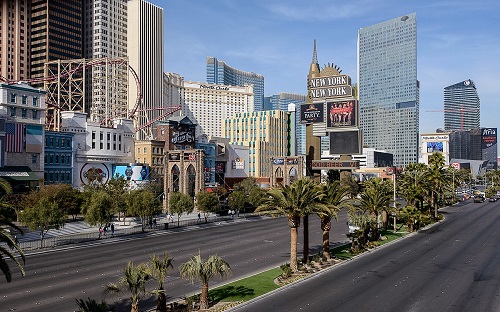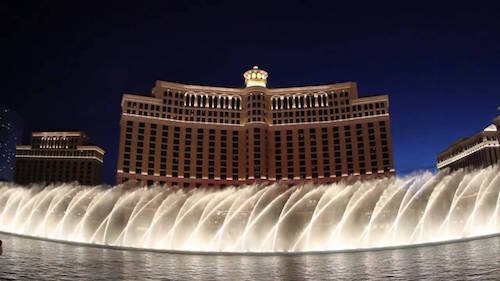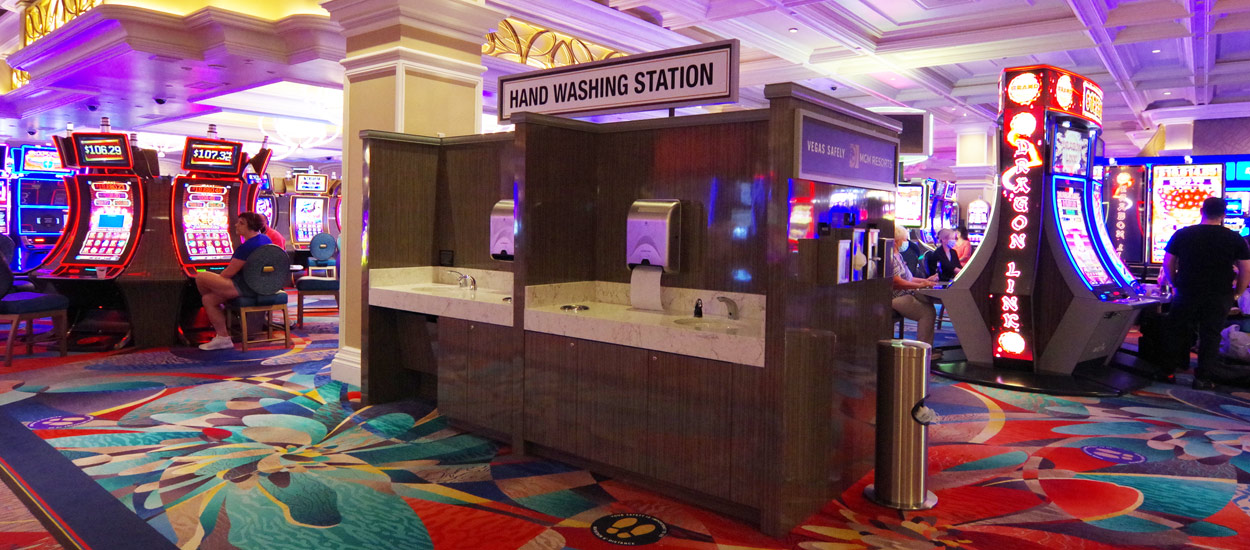Many states are allowing casinos to open
In late March, when the coronavirus was starting to spread, states started closing most businesses, but those in the gambling industry closed last. Governments were hesitant to shut down casinos since they relied on revenue from those businesses to fill state coffers, plus there was question as to what authority states really had over tribal casinos, which make up the majority of casinos in the U.S. As for commercial casinos, New Jersey ordered all Atlantic City casinos closed on March 16th and Pennsylvania and Nevada ordered all casinos closed on March 17th. Las Vegas Mayor Carolyn Goodman wanted the casinos to remain open, but the decision wrested with Governor Steve Sisolak who ordered them all to close to prevent the spread of COVID-19, even though the casino industry in Nevada employs over 485,000 people. To the casinos industry's credit though, the majority of casinos paid employees for the months of March and April and extended medical benefits until they could reopen. California was the last state to close casinos after the tribes resisted, but they reluctantly shut their doors following Governor Newsome's mandatory stay at home order. Sportsbooks throughout the United States closed as well, although with almost every sport shut down and the betting options were slim to none anyways. Where remote betting on sports was available some sportsbooks did take bets on obscure or lesser sports that were playing and states with online casino gambling, namely Pennsylvania, New Jersey and Delaware actually saw an increase in online betting, although it never reached the level of bets at physical casinos.
To the casinos industry's credit though, the majority of casinos paid employees for the months of March and April and extended medical benefits until they could reopen. California was the last state to close casinos after the tribes resisted, but they reluctantly shut their doors following Governor Newsome's mandatory stay at home order. Sportsbooks throughout the United States closed as well, although with almost every sport shut down and the betting options were slim to none anyways. Where remote betting on sports was available some sportsbooks did take bets on obscure or lesser sports that were playing and states with online casino gambling, namely Pennsylvania, New Jersey and Delaware actually saw an increase in online betting, although it never reached the level of bets at physical casinos.
As for other businesses in the gambling industry, horse racing tracks closed sporadically in the United States and Canada, although tracks in Oklahoma and Nebraska continued to operate without fans in the stands and Florida tracks operated on a reduced schedule, albeit without spectators. The decision to close horse racing tracks was controversial since the argument by the racing industry was that horses had to be upkept regardless of whether the tracks are open, plus the tracks said it was easy to physical distance and put in extreme hygiene measures so that the risk of spread would be low. And because of remote gambling it wouldn't be a huge hit to the tracks to run without spectators since the majority of betting takes place online anyways. Nevertheless, after outbreaks occurred at Belmont and Woodbine and after governors ordered mandatory closures of all businesses, almost every state as well as all tracks in Canada suspended operations.
Despite rising cases of COVID-19 throughout the United States, some casinos started reopening at the encouragement of President Trump, as well as Governors, who were arguing that the closures were killing them and that it was time to open up America again. The first casino to reopen was the Coeur d’Alene Tribal casino in Idaho on May 1st, a casino with 1,600 slot machines, video blackjack and bingo, as well as a hotel. The casino put in physical distancing requirements and required mask wearing by everyone in the casino, which meant that most of the machines were unavailable. The bars and restaurants stayed closed too, as did the hotel facilities, such as swimming pools. Not surprisingly, attendance has been quite low at Coeur d’Alene since reopening.
That opening was followed by ones in Montana, Washington State and South Dakota, but the first casinos to gain real notice by the media were the reopening of casinos in Arkansas and Arizona. Those casinos were a bit larger and the lines were exceptionally long to enter, which created a lot of buzz. Like Idaho, mask wearing was mandatory and the number of machines in operation was about 1/3 of what it was prior to their closing. Since that date, casinos in 25 of the states have reopened, including Nevada casinos which opened on June 4th. New Jersey indicated that they don't expect Atlantic City casinos to reopen before mid-July.
While all casinos have put in rules for physical distancing, including closing off adjacent machines (the D hotel in Vegas apparently hasn’t been as strict based on reports), the same is not the case for mask wearing. None of the casinos in Las Vegas casinos have made masks mandatory for patrons and it appears only about 1/3 of casinos in other states require them for patrons. All but three states always require that staff wear masks while on the gaming floor. The casinos all have masks available for guests if they request them, but they are not mandatory. Health experts have long suggested that masks should be required for everyone since there is less than a 2% chance of transmission when both people are both wearing masks, but masks can be uncomfortable, often smell bad (especially surgical masks) and can cause breathing issues for people with asthma and other diseases. As well there has been a lot of backlash against masks by people who argue that health authorities keep flip flopping on their effectiveness and even leaders such as President Trump and Vice President Pence refuse to wear them unless necessary.
Many people have also suggested that it was a first amendment issue. Vegas casino owners are well aware of the backlash and do not want to upset any patrons at this point in time when they are trying to lure people back. Some analysts, however, suspect there may be another reason why casinos are reluctant to mandate masks – it will be difficult to identify cheaters if they have a mask on and facial recognition, which is used to keep out those who have been banned or have self-excluded, may be impossible if the person has their face covered.
I spoke to a professional gambler who lives in Vegas and decided to visit a few casinos last weekend. He said he was very disappointed with what he saw.
"I went to the casinos with a mask on and expected to feel safe, but I didn’t. We were told that once things reopened we wouldn't recognize the casinos. They were supposed to be spaced out; everyone was supposed to be wearing masks; they were supposed to be cleaning machines, seats and all railings constantly; dealers were supposed to be cleaning the cards after every deal and the dice were supposed to be disinfected after every roll; there was supposed to be plexiglass to protect the workers and players; and there was supposed to be no cocktail waitresses. What I saw was the exact opposite. The casinos were only well spaced because there weren't many people there, but it seemed everyone was congregating around certain machines and tables, and no one was moving them along. Also, a couple of people were coughing constantly with no mask on, but no staff seemed to care. I guess the thinking was that if you didn't have a temperature as you entered the casino you were good to go, which is stupid. Getting a drink was also not difficult at all since all bars were open and I did see cocktail waitresses in every casino although it appeared the cups they were handing out were disposable. And for that matter I even saw some local hookers back. The only real change I saw were some handwashing stations. I felt very unsafe at the casinos I went to, so I just went back home and decided I will go back once the casinos take this virus seriously. I'm not willing to risk my life to gamble there – I have other options."
Most casinos in Las Vegas, as well as in some other cities that opened, were offering huge incentives to lure people back. Several casinos, including New York, New York, Luxor and the LINQ were offering $30 per night room stays and even the luxury hotels like Bellagio, Wynn and the Cosmopolitan had rooms for under $150 a night, which is unheard of. It is unclear how Vegas ensured that the hotel rooms were safe, although based on reviews at Trip Advisor it appears many casinos did little other than the norm. The following was a post on Trip Advisor by a couple who stayed at the Bellagio last week:
"Room and pool felt clean. Service is very slow given that the staff is running on a Skelton crew. My biggest concern is that smoking is still allowed in the casino. There is nothing worse than practicing safety wearing a mask and having people blow smoke in your face. So difficult to breathe in the casino part. It does not make sense to "suggest" wearing a mask while others just walk around smoking and making the gaming experience less enjoyable than it needs to be. There needs to be designated smoking areas. This is a long time coming and it is even more needed now. I’d say if you are into the pool area and enjoy the rooms come out. If you think you are going to feel safe in the casino floor, note that it is a real risk. There are dividers at the table games and hand washing stations but just a "bear hug" in my personal opinion. I suppose it is the best they can do.
I’d say if you are into the pool area and enjoy the rooms come out. If you think you are going to feel safe in the casino floor, note that it is a real risk. There are dividers at the table games and hand washing stations but just a "bear hug" in my personal opinion. I suppose it is the best they can do.
All around the atmosphere just feels intense and there is still a herd of people getting drunk and throwing out all safety guidelines for spread of COVID-19.
Just be safe people and if you smoke please mind others who have on their masks."
I reached out to a contact I have at MGM for some comments, but never heard back although a manager at Bellagio did respond to the above review at Trip Advisor:
"Thank you for taking the time to review our resort on TripAdvisor. We value guest feedback as part of our continual effort to improve the quality of the overall experience we strive to provide. It is disheartening to know that we fell short in providing you with a magnificent stay. Please know that we take all guest comments seriously and that we will absolutely be sure to share your review with the appropriate areas. We hope for the opportunity to serve you again in the future."
What is clear from all of this is that the Nevada casinos, along with the majority of Tribal casinos elsewhere, are doing everything in their power not to upset gamblers and are willing to take the risks of COVID-19, almost as if there are no other option. Employees at the casinos need jobs since the casinos only really covered their salaries for a month or two after they stopped operations and the majority of casinos were in financial difficulty prior to COVID-19 striking. As well, the borders are still closed to most countries including Canada, Brazil and those in Europe and Asia, where a large percentage of tourists (especially the high rollers) come from. Thus, the casinos must make locals and visitors from other U.S. states comfortable as that will be their bread and butter until there is a vaccine. Moreover, Macau and other Asian countries which opened, along with Monte Carlo, have seen only a fraction of tourists return and the casinos in the U.S. realize that will be their fate also. And unlike New Jersey, Delaware and Pennsylvania, there is little online gambling to supplement in-person visits to help stem the tide.
Many managers also take advice from politicians and health authorities and Vegas Mayor Carolyn Goodman clearly believes the threat of COVID-19 is overblown given her comments on national TV that in her opinion Vegas shouldn’t change anything and that the city should be used as "the control group" to see if the claims of spread are really accurate. It is doubtful, however, that locals would be happy being guinea pigs.
That said, Vegas could definitely consider some unique options to help make people feel safer including some of the initiatives in Monte Carlo - ideas such as having floating breakfast trays with disposable plates, glasses and cutlery and also using robots to deliver food and interact with guests in various ways. Unfortunately, those ideas cost a considerable amount of money which most U.S. casinos just do not have.
So, casinos have started reopening and by the end of June every state except a handful should be back in operation. Was it too early to take the risk? Are enough precautions put in place to prevent a large spread or second wave? Will guests ever really return like before? Only time will tell. But one thing is certain, until there is a vaccine and people truly feel completely safe, visits to casinos and hotel stays will never be what they once were.
Read insights from Hartley Henderson every week here at OSGA and check out Hartley's RUMOR MILL!








































